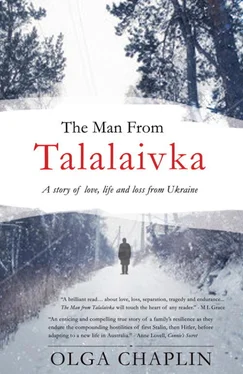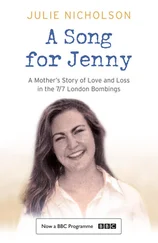His neck pricked with panic. “Dyna, she must sip some liquid… even this sweet tea… to hydrate her, no matter what.” He feared the consequences. He had to encourage Ola to drink. She was burning with fever, could even suffer a seizure. He prepared for her retching. He took off his boot and placed it strategically at Ola’s side, away from the others, and held her upright in his arms. The remainder of this journey would be traumatic for their little girl. But he had to persist, to control the situation as best he could, until they reached Bathurst station. He could not allow himself to contemplate that she would decline even further, could not contemplate that his weakening to Evdokia’s pleas at the Sydney terminal might lead to another sorrow after all those years of war and uncertainty.

Chapter 44
The brickworks horn sounded a series of double-blasts, denoting it was end of week closing time. A collective “Hoorah!” echoed as men downed tools. Peter looked up from his stacking work and grinned. These signature blasts were Jahn’s way of humouring his fellow workers, as if the young man were still working the coastline vessels of his native Dutch ports. He paused, contemplating the remaining bricks on the long conveyor belt and arched his back to ease the pain after hours of stooping and twisting.
He watched as men covered in brick dust and clay jostled good-naturedly as they sauntered to the utilities shed to wash. He surveyed the now-inactive conveyor belt again. It would take some additional time for him to clear the bricks and stack them on the palette. He removed his heavy glove, saw with dismay the calluses that burned and bled. But the conveyor belt needed to be cleared: a safety issue, the union had stressed. He looked up to an office window a short distance away. The union representatives had already packed up and gone, their vigilance relaxed for their Friday afternoon meetings at a Parkes hotel. He took a few deep breaths and moved faster in removing the bricks from the belt, then stacked the remainder to the required number on the timber palettes, two by two, this way and that, his hands moving automatically as if they were an extension of the mechanised conveyor system.
“Ah, Peter! Come on! It’s holiday time now—Christmas, next week! No need to over-work yourself! And you know what our union bosses would say if they saw you…” Jahn stood straight, and mimicked in his broken Ukrainian: “‘You are disloyal to The Cause—you must not work overtime outside the clock’!” He laughed and slapped Peter playfully on the back. “I will see you at the camp! We will celebrate with Christmas schnapps!”
The afternoon sun beat down over the stilled brickworks which, although not too distant from Parkes, had an even greater sense of isolation when the machines stopped and men departed. Already, a few dust-swirls picked up in the open pits by a lazy breeze hinted at the coming of summer’s tormenting heat. He sighed in relief as he entered the utilities shed and washed with tank water warmed by the sun’s heat, grinned and shook his head as he remembered these same pipes had become frozen in the cold months of winter. The extremes of this far away sunny country were still confusing to the northern European mind.
He put on his faded clean shirt and, wrapping the few belongings he had brought with him that morning, he secured them to his bicycle rack. There was now no need to back-track to the billeted farmhouse nearby, his temporary abode during the week. His heart skipped a beat, as it did each Friday afternoon, as he thought of his little family waiting for him at their Parkes hostel camp.
Each Friday, these past seven months, he could celebrate his return home to Evdokia and their children from his ‘brick-pit’. Each weekend he good-humouredly regaled comic events at the brickworks, his wit brushing aside the exhaustion of the work, the loneliness of each night, despite the kindness of the farmhouse family, which supplemented its own meagre existence with these billeted European strangers.
He peddled at a leisurely rate, re-invigorating himself with each mile on the pitted gravelled road, ever watchful for the sharp granite-like stones that often cut through the worn bicycle tyres. With still some distance to go, he stopped to drink water from his metal thermos, and lit his rolled cigarette. He breathed out the strong pungent smoke, watched its wispy trail dissipate in the afternoon haze. It was during such moments, when he was quite alone in the relative quiet of the day, that he could observe and contemplate the surroundings, the life around him. There was a flatness—almost a blandness—in this part of the countryside, yet life stirred in the most unexpected ways. Birds of all descriptions and colours called to each other and dived among the many species of eucalypt trees, and wallabies and kangaroos paused, often in an upright position, before suddenly springing across the gravelled road as they headed from one pastureland to another. A hint of refreshing eucalypt hit his nostrils, then the burnt-bark smell of a far away bushfire. He instinctively stubbed out his cigarette, scraped at the red earth with his boot, and buried the butt.
Nadia and Ola were already waiting and ran to him as he peddled up to their one-room hut. “Tato! Come on, come on! I have to show you what I did in class this week!” Nadia couldn’t contain herself, pulling at Peter’s shirt as he secured his bicycle to the handrail. He laughed and tousled her hair, lifted and spun her around. Already, she had thrived and grown in this climate of fresh air and plentiful canteen food in the safe hostel haven.
And so had Ola. No longer pale, the freckles scattered across her browning face and with her hair wispy and white in the sun, she was an entirely different child, it seemed, from the near-tragic days of their arrival. She clasped her thin arms around his neck as he held her up. She was still light, but energetic and beaming. She nuzzled her cheek against his unshaven face and grimaced. He laughed as he gently lowered her. He blinked, his eyes stinging with emotion as he thought back to their arrival in Bathurst, of the ambulance waiting to take their child directly to hospital: of the tense days, that continued on to five anxious weeks, awaiting Ola’s full recovery in the hospital ward.
Evdokia, upon hearing their voices, stepped out of the hut and came down the few stairs to embrace him. Her hair freshly washed and coiled into a neat bun she, too, now exuded a quiet confidence. He smiled as he remembered their first meeting all those years ago, in their Ukraine. Outwardly, she seemed unchanged. The late afternoon was still serenely warm, but he shuddered as he remembered Evdokia’s distress and sense of foreboding in those early weeks of arrival. He shook his head, as if to dispel the memory. It was with relief that he had grabbed this chance to earn the meagre wage for his family at this far away place of Parkes, with its displacement hostel, and to put the memory of their Bathurst months behind them. And he had to fulfil his commitments. Their arrival as displaced persons was conditional: he had signed papers, was committed for at least two years to work wherever he was needed. The government of Australia wanted them to be employed as quickly and usefully as was possible. And he and Evdokia needed to look to another future in their new country.
“Oh, those wonderful doctors, and nurses!” he thought in admiration and praise, still in awe that among this chaotic wilderness were caring people who came to their aid without question or malice. He was so grateful for their dedication in treating for weeks a child from the other side of the world, a child not yet one of their own citizens. “If this is what this Australian country stands for, they deserve to have our loyalty in return.”
Читать дальше













